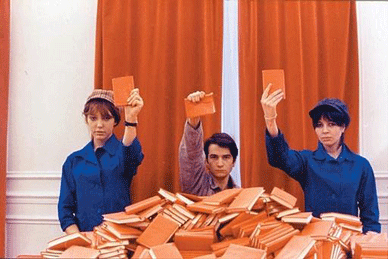only magazine
↵ home
La Chinoise

By Adam Thomas
Thursday April 17, 2008
WELL RED
Fifty years ago this May, something happened. It was a call to intellectual arms, as students in Paris participated in a full out strike that brought the country to a veritable standstill and brought the politics of emerging left wing Marxism into the mainstream. A reaction against the French establishment, particularly the DeGaulle government, the protests began at Universities but soon spread to the streets and, in combination with labour unions, included almost two thirds of France’s working population. What started out as a simple, student lead discussion on social discrimination and the failings of bureaucracy was met with police action, and what was originally a simple conflict between students and University heads soon escalated to a full blown national strike, complete with riots in the streets across the country.
It is in this context that Jean-Luc Godard’s premonitionary treatise on art, film and politics, La Chinoise finds its meaning, as it essentially predicts the events that would transpire a year after its release. With Breathless (1959), Godard revolutionised contemporary cinema – inventing the jump cut, blending naturalism with gangster mythology and including pop elements like jazz to the soundtrack. With La Chinoise, he again breaks with the rules of coherent narrative, completely and artfully challenging the methods and meaning of cogent philosophical debate. A defiantly playful contemplation on Marxism, pop culture and violent revolution, it is filled with the paint, pop art and left wing slogans that reflected the growing distrust, frustration and exasperation that personified the intellectual youth and working class in France in the late ’60s. Where Breathless transformed the parameters of narrative story telling and cinematic construction while maintaining a cohesive structure, La Chinoise is told in chapters, seemingly without necessary order, and certainly without a functioning plot. Its purpose is different, and so is its form.
Godard, known for his own personal affinity to Marxism, manages to construct a film that is both serious in its philosophical contemplations and almost mocking in its examination of its own form. It manages to play both sides, without debasing itself to the level of pure irony. Following a group of left wing students who read Marxist philosophy, paint their apartment red and deconstruct the meaning of political revolution, La Chinoise is a reference to the emerging cultural revolution that was going on in China. Icons of Mao abound as the actors – sometimes playing actors and sometimes playing themselves – read from the Red Book, peer out of red painted windows and hide behind red painted furniture. Indeed, the colour is everywhere, an inescapable reminder of the film’s primary tone. But the film is not propaganda, nor is it simplistic in its affinity for Marxism.
As the characters converse and debate with each other, they also exist in a state of permanent self awareness, bouncing back and forth between rhetoric spouting revolutionaries and chain smoking students doing the dishes. Even the apartment they inhabit functions like a personal theatre in which they can act out their violent fantasies and then retire to the salon for a glass of wine and another smoke. This constant construction of duality balances the reverence for the ideas, but also infuses a certain level of contempt (on Godard’s behalf) into the film. Made strikingly evident when the characters mimic the struggle of the Vietcong in their battle against Imperialist America, as portable radios unfold like tranformers to become machine guns at the same time as comic book images of G.I Joe and Captain America alternately strobe across the screen, Godard seems to be suggesting that while the debate is commendable, the nature of simple academic discussion remains detached; ultimately constructed and insular.
But if he demonstrates a mocking fondness for his left wing students early on, the final act of the film finds Veronique (Anne Wiazemsky) out of the apartment and on a train traveling through France, engaged in a political discussion with French born Algerian sympathiser Francis Jeason. As part of the underground connection between metropolitan France and the Algerian National Liberation Front, Jeason would have operated for those who sought Algerian independence through violent means. As Veronique begins the debate, the theories we have heard discussed find relevance in her discussion of terrorism and revolution in the context of the real world. Here, Godard’s sense of irony recedes as questions of purpose and of possibilities offer prescient warnings about what would happen within the year.
Breaking with the traditional form of narrative cinema, Godard has proven himself to be a true revolutionary. Eschewing the old style for one so decidedly new and non formal, we are offered a sincere look at the philosophical contradictions that exist when true revolution is considered. La Chinoise is a boldly political film, working from the inside out, placing content before construction. Still there remains a vivdly personal tone, one that both engages and alienates as it presents a moment in time where around the world politics were fresh, the youth were engaged, and the future seemed, for an instant, your own. Ah, those were the days.
La Chinoise plays @ Pacific Cinematheque April 19th- 26th. Go here for times.
